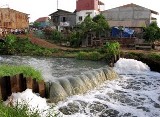
The most crucial infrastructure for managing South Africa’s environment is water and wastewater infrastructure. The dire need to improve wastewater-treatment plants and water management skills in South Africa can also develop significant, sustainable employment, says Rhodes University Unilever Centre for Environmental Water Quality director Professor Tally Palmer.
“Our ability to supply rivers with the water they require to function depends, in turn, on our management of dams. ‘Infrastructure development is often regarded as being in opposition to environmental protection. However, we must think about infrastructure specifically in relation to the maintenance of ecosystems that offer us services,” she says.
“Another particularly important infrastructure focus where South Africa has not taken as much initiative as it could is wastewater treatment works, which is critical infrastructure that acts as a buffer between human waste discharge and environmental functions,” highlights Palmer.
In South Africa, inadequate wastewater treatment is deteriorating the quality of water and diminishing the capabilities of river systems to cope with contaminants. It is also costing industries that extract the water money. This necessitates that consensus be developed through engagement among all industries on the effective treatment of wastewater and industrial pollution streams entering river systems to reduce costs to industry.
The importance of wastewater treatment functioning as a buffer between human health and environmental health means that the Green Drop wastewater treatment initiative is the most important water management innovation in the past five to ten years, she emphasises.
In South Africa, inadequate wastewater treatment is deteriorating the quality of water and diminishing the capabilities of river systems to cope with contaminants. It is also costing industries that extract the water money. This necessitates that consensus be developed through engagement among all industries on the effective treatment of wastewater and industrial pollution streams entering river systems to reduce costs to industry.
The importance of wastewater treatment functioning as a buffer between human health and environmental health means that the Green Drop wastewater treatment initiative is the most important water management innovation in the past five to ten years, she emphasises.
“In South Africa, the intervention that would make the most difference to river health is efficient and sufficient wastewater treatment. If government wants to focus on a job-creation programme and skills development and training, then the programmes that will increase the capacity to efficiently operate wastewater-treatment works will be necessary and sustain- able. “Currently, many of our wastewater-treatment works are held together and are operated beyond design capacity by engineers.”
If government aims to improve infrastructure investment in water, then the upgrading, maintenance and construction of new and existing wastewater-treatment works would be the most effective method to boost water quality and river health, Palmer says.
“Importantly, if infrastructure is the mediating layer between society and the environment, it is vulnerable to human error in its maintenance and management. It is no use having a dam that can release environmentally necessary flows if the managers do not understand what they are doing and why they are doing it.”
“Building infrastructure is the easy part; training and engaging with the people who manage the infrastructure are the important parts,” she avers.
Many jobs can be created through a wastewater-treatment initiative, similar to the non-profit programme Working on Fire and the Department of Water and Environmental Affairs’ work programme Working for Water, Palmer highlights.
However, the coordination of further education and training colleges will be needed to produce the skilled operators and wastewater-treatment workers. This can be subsidised as a job-creation process, requiring the relevant sector education and training authority to intervene to enable South Africa to husband its water sources.
Water Researchers “If we focus on this for ten years and upgrade and make wastewater-treatment works efficient, this process will have a significant effect on South Africa’s river health. Water researchers regard the management of infrastructure as a key intervention point to manage the environment.”
Palmer highlights that tertiary institutions, researchers and industries will have to engage directly and continuously with communities and wastewater-treatment workers and managers to improve wastewater-treatment understanding and, hence, the effectiveness of management to improve river health and water quality in South Africa.
By Schalk Burger
Source: Engineering News
